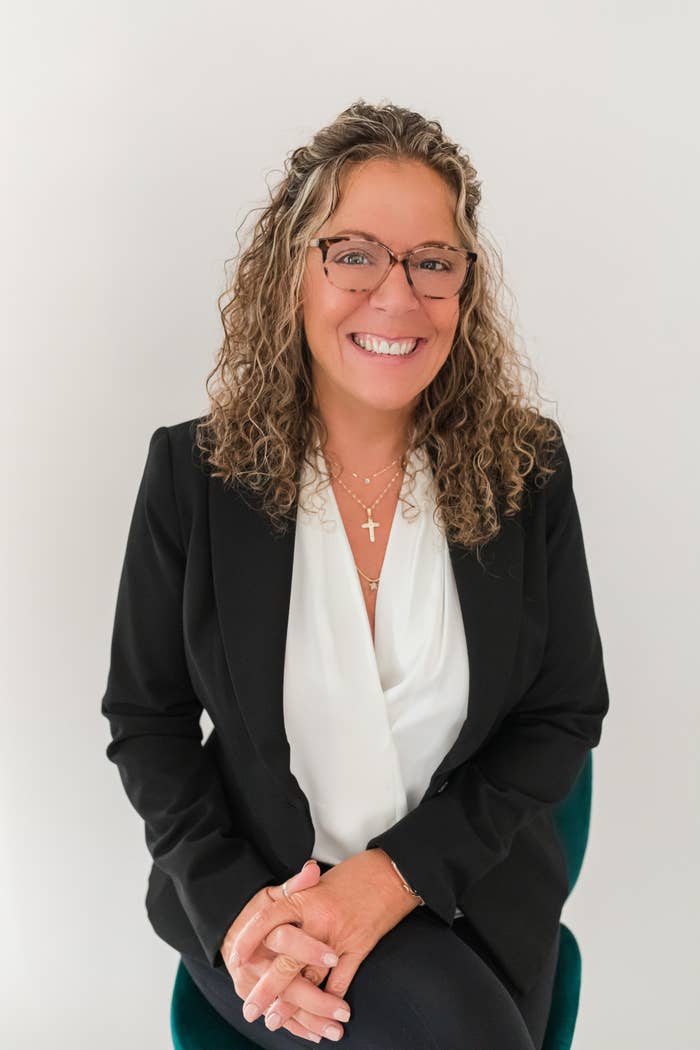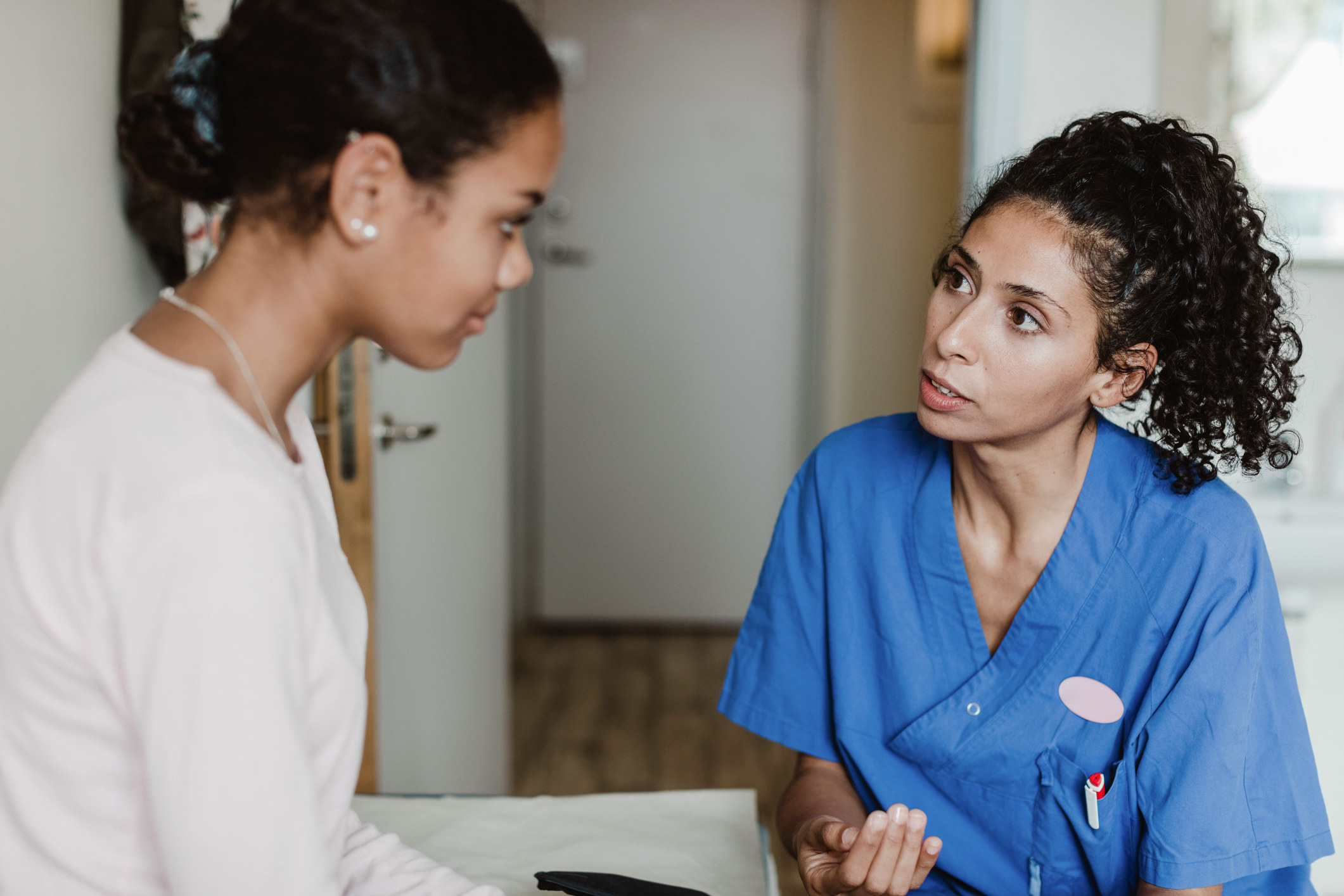
We spoke to Connie Stark, a certified registered nurse in reproductive medicine and infertility, and the Director and Lead Fertility Outreach Coach at Robyn. Stark answered the most pressing questions about fertility, including common myths, the importance of community support, and the experience of working with a fertility coach below.
Conceiving — it’s as easy as simply having sex. True or false?
Stark: A great question that deserves more than “true” or “false” as an answer! It would be awesome if conceiving was as easy as having sex, but this wouldn’t be inclusive of all aspiring parents’ experiences. Conception is a surprisingly complex topic, and there are many paths to growing your family. While every couple's experience is different, there are several factors at play as to why they may have trouble getting pregnant, such as the female partner, the male partner, a combination of both, or unexplained.
So, in short: false.

As a certified nurse in reproductive medicine, you’ve probably heard of all sorts of myths. What is the biggest fertility myth you want to bust right here, right now?
Stark: One common fertility myth that comes to mind when a couple may not be able to get pregnant is that the woman is always the reason — she’s the one experiencing infertility. Today, I’d like to bust that myth and share the facts. There are many factors at play and both women and men can contribute to infertility. In fact, 1 out of 8 couples in the U.S. struggle to get or stay pregnant¹, and there are many risk factors that can play a role in fertility for both men and women. So, if you are having trouble getting pregnant, know you are not alone. And most importantly, there is no room for fault or shame when there is a desire to be a parent.
To bust the myth is to change the language from assuming fault and move toward understanding that infertility is an actual medical diagnosis¹ that can affect both females and males (with a percentage of some infertility diagnoses being unexplained). Reproductive health awareness for both females and males is essential.

What is a fertility coach? Could you explain what that is for our readers who aren’t familiar?
Stark: Fertility coaches are individuals who support aspiring parents on their journey to parenthood. Because it can be a broad title encompassing different types of roles, I will explain my role as a fertility coach. I am a certified registered nurse in reproductive medicine and infertility, as well as a certified life coach. I have had the honor to work in various fertility clinical and administrative roles. I’ve also had many fertility experiences in academia, private, and corporate clinic settings over the last 30 years, at the side of thousands of aspiring parents' journeys to grow their families.
I’m now the Director and Lead Fertility Coach for Fertility Outreach, a text-based platform, which was recently launched by Ferring Pharmaceuticals in partnership with Robyn, an online community that provides access to fertility and parental wellness resources. Our fertility coaching approach supports aspiring parents with a proactive coaching methodology, paired with guidance, personalized information, and resources that complement the care an aspiring parent receives from a healthcare provider.

What is Fertility Outreach?
Stark: Fertility Outreach offers a convenient method of connecting with a fertility coach via text message where aspiring parents receive information and answers to individual questions. The foundation for the Fertility Outreach offering is based on three principles:
•Expert-driven, reliable answers: All Fertility Outreach fertility coaches are vetted, certified nurses with 3+ years of experience working in a fertility clinic.
•Real-time support: You just need your phone — our fertility coaches are available over text message to offer support that's timely and action-oriented.
•Personalized, complementary information: Our fertility coaches aim to guide you with customized information, educate you, and support you while prioritizing your physical, mental, emotional, social, and financial well-being on your unique journey to parenthood, and this complements the medical care you may be receiving.
Fertility Outreach uses a proactive fertility coaching approach, changing the language to living “in fertility” as opposed to living the diagnosis of “infertility.” Our goal is to guide and support aspiring parents to feel empowered and informed so they can make the decisions that work best for their journey.

How might someone benefit from working with a fertility coach and who should seek their guidance?
Stark: My role as a fertility coach is to guide and navigate people who are planning for a family now or even in the future. Anyone who wants to learn about reproductive health, or has general questions about their fertility journey, can receive credible information in one place from a “live” fertility coach through Fertility Outreach. We’re here to provide individualized guidance and support based on each aspiring parent’s needs to help them move forward wherever they are in their journey.
One piece of advice I regularly give is that women and couples should consider seeing a fertility doctor or RE (reproductive endocrinologist) if they are unable to get pregnant after a year of unprotected sex if the woman is under 35, or after six months if the woman is over 35.

Can you share an example of how your coaching has helped someone on their path to parenthood?
Stark: Sure! My role is to provide individualized guidance across the five points of well-being, including mindset, emotional, physical, social, and financial. This complements the support provided by loved ones and healthcare providers. One example that is top of mind is a 35-year-old female who had been trying to conceive for almost 1 year and was diagnosed with polycystic ovary syndrome (PCOS) by her OB/GYN. She was feeling frustrated and confused about what her next steps should be. She was also feeling defeated and alone. She reached out to me for fertility coaching services.
After learning more about her, we discussed her personalized plan focusing on a proactive mindset and physical well-being changes. She also scheduled an appointment with a fertility doctor. We focused on dietary changes, while continuing her exercise routine. I also encouraged her to write in her gratitude journal – to capture what she felt thankful for each day. She began to feel empowered, and engaged in social and family gatherings again. She also started to have clarity to make proactive decisions with her partner and finally pursued her next step: an in vitro fertilization (IVF) cycle.

What types of questions do you typically receive as a fertility coach?
Stark: There are so many different types of questions that are asked, as all paths to parenthood are unique. But here are some of the more common ones:
•How can I find a fertility doctor?
•When should I see a fertility doctor?
•What should I expect at my first consultation with a fertility doctor?
•Any tips on understanding costs and insurance for fertility treatment?
•What can I do to improve my health and wellness for getting pregnant?
•How do I know when I’m ovulating, and when is the best time to “try” each month?
•Any tips on managing polycystic ovary syndrome (PCOS) symptoms?
•What is the fertility testing process like?

How could one benefit from a support system when they’re on this journey to parenthood? Especially with the busy holiday season coming up, what's the importance of support through fertility coaching during this time?
Stark: Community can mean different things to different people. Community support can be provided by a group of people who have similar experiences, such as friends or loved ones, in hopes of connecting, learning, and feeling less alone. It does not have to be an in-person group to be meaningful either.
Community support can complement the support from loved ones. Around the holidays, I encourage family members and friends to lead with empathy and compassion and keep in mind that you likely may not know everything aspiring parents are going through. Gatherings, whether they be social, professional, or familial, including over the holidays, can bring on mixed emotions of excitement and dread for someone on a fertility journey.
Creating a community of supportive people to lean on (including a fertility coach), may be a source of additional comfort and allow you to live your best self while on the path to parenthood. Consider visiting the Fertility Out Loud website or @fertilityoutloud on Instagram to see the stories of people on a similar journey.

Before we end our interview, are there any other persistent fertility myths you want to address? And do you have any tips on how people can stay informed on the topic of planning for parenthood?
Stark: It’s important to remember that everyone’s journey to parenthood is different. Let’s continue the conversation and advocate for fertility and family-building awareness. Different paths to parenthood can be possible, and sometimes you may just need someone to lean on to stay on that path. Think about it as if you were looking through a camera. Focus on knowledge and credible information guided with proper support — all to keep the vision of parenthood clear!
Fertility Outreach is not intended or implied to be a substitute for professional medical advice, diagnosis or treatment. Patients with questions about medical advice, diagnosis, or treatment should speak to their physician or medical provider.
You're not alone in your fertility journey. Visit Fertility Outreach to connect with a fertility coach.
All images via Getty.
1. RESOLVE: Infertility Facts, Diagnosis and Risk Factors
